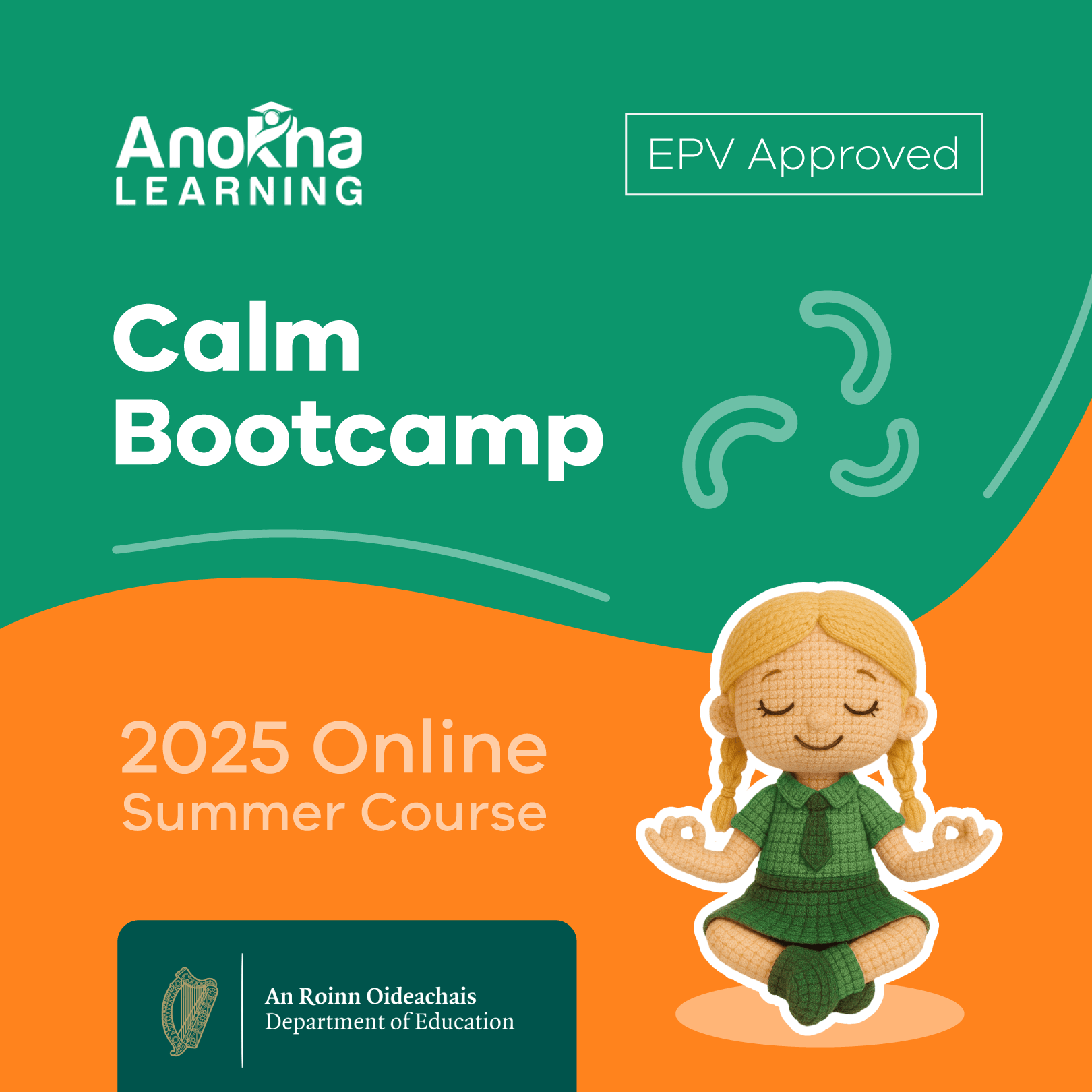A Teachers Insight
We would rather you hear about this course from your peers! "This is the best online summer course I’ve done. I feel I’ve actually achieved the learning outcomes of the course!! I feel like I have a useful and practical bank of resources to implement strategies of mindfulness and kindfulness in the classroom. I feel I have a thorough enough knowledge of the theory behind these practices and that I can help alleviate stress and anxiety in my classroom by adopting various approaches. The most meaningful outcome to me was the effect guided meditation/mindfulness can have. I was listening to the video as this was happening and woke up an hour later on the sofa! I completely wound down and relaxed my mind and body - clearly it was needed!! I found it so effective. It’s not something I’ve engaged much with in the classroom but from the course I’m much more likely to engage with it." Ruth's Course Reflection

Course Structure
20 hours of learning. Participants must complete 10 hours of online learning and 10 self-verified hours (module exercises, resources, discussion forum and reflective learning log). Technical Support provided.
Compulsory elements - 2 discussion forum posts per module, Reflective Learning assignment, creation of personal learning record. You must complete the required time on the course before a certificate can be issued.

Certification/EPV Days
All Anokha Learning Summer Courses for Teachers have been approved by the Department of Education & Skills for EPV Certification. Start and completion dates printed on your Cert.
EPV days awarded as follows:
1 course – 3 EPV days, 2 courses – 4 EPV days , 3 courses – 5 EPV days
If you buy two or more courses you must only complete one course at a time.

Duration
For 2025 our courses will commence on Tuesday 1st July, and all courses must be completed by 5 pm on Friday 18th July. If you buy two or more courses you must only complete one course at a time. As per the DES criteria you must complete the required time on the course and your start and completion dates will be printed on your Cert for your EPV days.
"Calm Bootcamp is the perfect summer course for any teacher who wants to promote wellbeing in the classroom and in one's own life." Yvonne
"I can honestly say that I have finally found an online summer course that I 100% enjoyed doing from start to finish and the course requirements weren't a struggle to achieve. Calm Bootcamp contained practical and effective ideas and suggestions for the classroom. I am excited to implement some of them next year and will share ideas with my colleagues also. I couldn't recommend this course highly enough and I know I will return to Anokha Learning again next summer." Katie
"Really engaging course, enjoyable to do with practical ideas, strategies and resources for the classroom. Will definitely come back to do another Anokha course again - well run, easily accessible and interesting throughout." Mari
"I really enjoyed this course! I learned so much for myself and gained so much for my teaching. The ideas and support from others on the course is fantastic. I cannot recommend this course enough!" Ami
"The calm boot camp was an excellent course. It was very informative and thought provoking. Excellent resources were provided which are very relevant to everyday life in the classroom. I really liked the audio link accompanying each slide of the PowerPoint. It was very easy to listen to and engage with. The discussion forums were excellent also and it was great to get different ideas from other teachers on strategies they use in their classrooms." Elaine
"The 'Calm Bootcamp' course was very enjoyable. It is so relevant to teaching today as it gives you insight into what stress can do to children and the strategies that we can use to help them to cope with stress. Using these strategies in the classroom will benefit children and teachers alike. They would create a positive classroom environment full of gratitude and 'kindfulness'. I highly recommend this course." Amy
"Very topical course. Mindfulness should be incorporated into the school day and this course gave many insights, ideas and the push to ensure that this can happen in September." Siobhan
Course Modules
What is stress? What is anxiety? Exploration of emotions. Neuroscience of stress on brain and nervous system. Importance and relevance of relaxation & calming strategies – teacher & child. Practical application in the classroom, CBT work & reframing.
Practicing Kindfulness towards self and others. Self-compassion tools for stress, inner critic, negative thoughts. Coping Skills – CBT. Practical strategies to cope with anxiety. Kindfulness in the Classroom. Empathy. Fostering a calm positive climate for success. Guided meditations & visualisations.
Mindfulness practices: Come to Your Senses. Relaxation strategies: Body Scan, PMR, Mindful Movement. Connecting to breath. Different kinds of breath-work, Developing attitude of gratitude, using affirmations.
Wellbeing Well & how to fill well. Revise practical strategies & coping skills. Goal setting. Role models. Support systems. Elements for good ‘wellbeing; nutrition, exercise, adequate sleep, outdoors etc. Resilience, positive thinking, affirmations.
More mindful movement. Connecting more into the body: exercises, stretches, activities to help focus etc. Awareness of surroundings. Respecting other people’s personal space etc. Assertiveness skills. Reframe inner critic. Kindfulness & Self Compassion. Deepening breath work. Calming strategies.
About Ciara Lynch
Ciara has worked as a Primary School Teacher for over 12 years and has experience of teaching a variety of classes. In recent years Ciara has worked primarily in a Learning Support/Resource capacity. Her qualifications in Psychology, Counselling and Psychotherapy, as well as Play Therapy have made her better equipped to work with children experiencing a variety of emotional, mental and behavioural difficulties.
Ciara is also trained as a Sensory and Proprioceptive activities facilitator and a Mindfulness Practitioner. She has an avid interest in yoga and mindful movement as a means of reducing anxiety and stress and increasing self-care and cultivating positive self-image.

